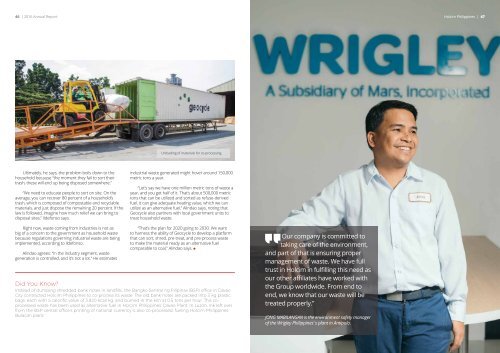HOLCIM AR 2016 FA_LR 5-26-17
You also want an ePaper? Increase the reach of your titles
YUMPU automatically turns print PDFs into web optimized ePapers that Google loves.
46 | <strong>2016</strong> Annual Report<br />
Holcim Philippines | 47<br />
Unloading of materials for co-processing<br />
Ultimately, he says, the problem boils down to the<br />
household because “the moment they fail to sort their<br />
trash, these will end up being disposed somewhere.”<br />
“We need to educate people to sort on site. On the<br />
average, you can recover 80 percent of a household’s<br />
trash, which is composed of compostable and recyclable<br />
materials, and just dispose the remaining 20 percent. If the<br />
law is followed, imagine how much relief we can bring to<br />
disposal sites,” Ildefonso says.<br />
industrial waste generated might hover around 150,000<br />
metric tons a year.<br />
“Let’s say we have one million metric tons of waste a<br />
year, and you get half of it. That’s about 500,000 metric<br />
tons that can be utilized and sorted as refuse-derived<br />
fuel. It can give adequate heating value, which we can<br />
utilize as an alternative fuel,” Alindao says, noting that<br />
Geocycle also partners with local government units to<br />
treat household waste.<br />
Right now, waste coming from industries is not as<br />
big of a concern to the government as household waste<br />
because regulations governing industrial waste are being<br />
implemented, according to Ildefonso.<br />
Alindao agrees: “In the industry segment, waste<br />
generation is controlled, and it’s not a lot.” He estimates<br />
“That’s the plan for 2020 going to 2030. We want<br />
to harness the ability of Geocycle to develop a platform<br />
that can sort, shred, pre-treat, and pre-process waste<br />
to make the material ready as an alternative fuel<br />
comparable to coal,” Alindao says.<br />
Did You Know?<br />
Instead of dumping shredded bank notes in landfills, the Bangko Sentral ng Pilipinas (BSP) office in Davao<br />
City contracted Holcim Philippines to co-process its waste. The old bank notes are packed into 3 kg plastic<br />
bags, each with a calorific value of 3,820 kcal/ kg, and burned in the kiln at 0.5 tons per hour. This coprocessed<br />
waste has been used as alternative fuel in Holcim Philippines’ Davao Plant. In Luzon, ink left over<br />
from the BSP central office’s printing of national currency is also co-processed, fueling Holcim Philippines’<br />
Bulacan plant.<br />
Our company is committed to<br />
taking care of the environment,<br />
and part of that is ensuring proper<br />
management of waste. We have full<br />
trust in Holcim in fulfilling this need as<br />
our other affiliates have worked with<br />
the Group worldwide. From end to<br />
end, we know that our waste will be<br />
treated properly.”<br />
JONG MABILANGAN is the environment safety manager<br />
of the Wrigley Philippines’ s plant in Antipolo.


